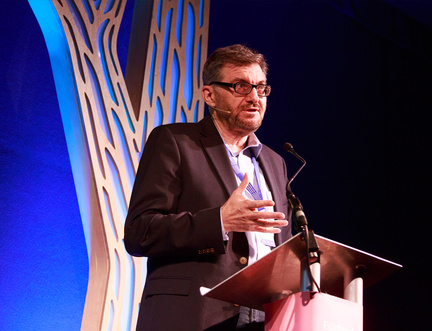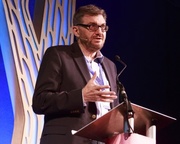More articles Thursday 15 August 2019 12:30pm
“You can conceal truth but you can’t conceal it forever,” says Serhii Plokhy

The Ukrainian historian spoke with writer and broadcaster James Crawford about the Chernobyl nuclear explosion, about which he wrote in his Baillie Gifford Prize-winning book Chernobyl.
“You can conceal truth but you can’t conceal it forever,” said Plokhy at the Edinburgh International Book Festival last night. “On one level we certainly know more today about Chernobyl, about what caused it, about the consequences, than we knew, certainly immediately after the explosion, or even five years ago.” Plokhy said. “On the other hand we know more, but I’m not sure that we understand more.
“There is really a direct line between [the] Chernobyl explosion and five years later, the fall of the Soviet Union… [It was] the inability to handle the truth about Chernobyl and face the people of the Soviet Union that eventually led to the mass mobilisation in republics like Ukraine.
“The atmosphere of secrecy was there and it was overriding any emerging culture of safety with nuclear [power]… keeping information and truth even from the people in the field, was one of the reasons for [the] Chernobyl explosion.”
Plokhy argued that even though more information is being discovered about the disaster and nuclear power, we still don’t have a consensus about the energy source.
“We’re also in a situation where there are too many sources of information, too much disagreement. There are vested interests. There are interests of the nuclear industry.
“There are people, like myself, who are really concerned about climate change. Nuclear can help us, that can save us. And again that’s another group of people that have legitimate concerns and have a proposal of how we can deal with that… I think the solution is not to build more reactors but take good care of those that we have right now.
“Even if things go right and the reactor doesn’t explode and everything is good, it goes through its resource. An enormous amount of money is needed to decommission the whole thing, to clean, and then forever and ever and half forever again, to care about the spent fuel.”
When asked about how to prevent the cost-cutting witnessed in the Soviet Union being repeated by commercial nuclear power providers, Plokhy stressed the necessity for independent watchdogs.
“Government oversight, independent oversight, should be there. The independence of that watchdog, the absolute independence of the body is essential.
And what we have today in the world scale, we have the International Atomic Energy [Agency] which is a wonderful institution, which is responsible for two things at the same time. One is the promotion of nuclear energy in the world, useful uses of nuclear energy. And now.. making sure that nuclear power plants are up to standards… There is a conflict of interest.”
Look, Listen & Read
Find Events
Latest News
 Celebrating the 2024 Book Festival
Celebrating the 2024 Book Festival




